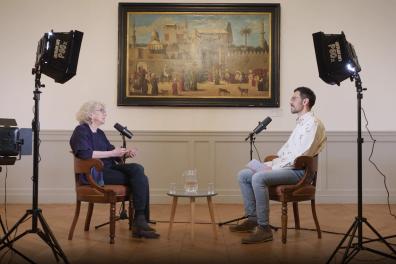Meet Irène Bellier, anthropologist specializing in indigenous peoples

The "Portraits of Researchers in Area Studies" (PEA) collection is a series of large-format interviews produced by Inalco as part of the Digital Paris Research School of Area Studies (D-PaRSAS) institutional project. Deposited on the MediHal open archive, this series of portraits joins a set of collections on the Language and Cultural Area Studies (LaCAS) platform. These collections aim to build up a living, freely accessible scientific heritage of research on the world's languages, societies and cultures.
Large-format portrait
Podcast:
Irène Bellier is an anthropologist, director of research emeritus at the CNRS and member of the Laboratoire d'anthropologie politique (LAP, UMR 8177). In this interview, she looks back at her career and the fields of her research, from the Peruvian Amazon to the international indigenous peoples' movement, via the institutions of power - ENA, the European Commission and the UN. It also discusses the work Irène Bellier has carried out as part of the "Scales of Governance, the United Nations, States and Indigenous Peoples: self-determination in a time of globalization" (SOGIP) research program she piloted between 2010 and 2015, as well as the "Justice and Rights of Indigenous Peoples" (JUSTIP) network she has been leading since 2017.
She graduated from the Institut d'études politiques de Paris in 1976, and earned a doctorate in ethnology and social anthropology from EHESS in 1986, beginning her career with a thesis on the relationships between women and men in an Amerindian society in the Peruvian Amazon, the Mai huna (Western Tukano), which was published as El temblor y la luna. Ensayo sobre las relaciones entre las mujeres y los hombres mai huna (IFEA, 1991). She then turned to the anthropology of institutions and politics, studying the training of elites at ENA (L'Ena comme si vous y étiez, 1993) and the cultural diversity of the European Commission, culminating in the publication of the report An Anthropology of the European Union. Building, Imagining and Experiencing the New Europe (Routledge, 2000).
From 2001, she specialized in the international movement of indigenous peoples and their rights, observing work dedicated to these issues within the United Nations. She was vice-president of the GEMDEV (Globalization and Development Study Group) and also vice-president, then president of the GITPA (International Work Group for Indigenous Peoples).
Parallel to this, she helped found LAIOS, the Laboratoire d'anthropologie des institutions et des organisations sociales (CNRS-EHESS), which she directed, and within which she assumed scientific responsibility for SOGIP, a collective and international research program on scales of governance and indigenous peoples' rights. She participates in several international scientific networks, including the Réseau Dialog (INRS, Quebec) and the réseau international de recherche (GDRI) JUSTIP, supported by the CNRS.
Author of numerous books and articles on the subject, she has notably coordinated the "Horizons autochtones" collection published by L'Harmattan: Peuples autochtones dans le monde. Les enjeux de la reconnaissance (2013); Terres, territoires et ressources. Policies, practices and rights of indigenous peoples (2014); What education for indigenous peoples (2016); The rights of indigenous peoples. From the United Nations to local societies (2017), co-authored with Leslie Cloud and Laurent Lacroix; and Scales of governance and indigenous peoples' rights (2019) with Jennifer Hays. Among his latest articles: "Indigenous peoples in the face of genocide, ethnocide, ecocide" in Penser les génocides. Itinéraires de recherche (CNRS, 2021) and "Pensar la autonomía de los pueblos indígenas en el marco del derecho a la autodeterminación" in Autonomías indígenas en la Amazonia contemporanea, edited by Raphael Colliaux and Silvia Romio (IFEA, 2021).
On June 14, 2024, Irène Bellier was appointed by the Minister of Higher Education and Research, Sylvie Retailleau, to the rank of Chevalier de la Légion d'honneur, for her career as an anthropologist.